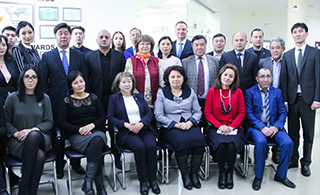Astana Hub is to Launch Peer Learning Alliance on e-Governance


The Astana Civil Service Hub and Almaty Management University with support from the e-Governance Academy of Estonia organized a seminar entitled “Developing e-government: experience, challenges and perspectives”. The Seminar gathered the representatives of akimats from different regions of Kazakhstan and experts in the field of public administration, including those from the Hub participating countries.
Chairman of the Steering Committee of the Astana Civil Service Hub Alikhan Baimenov, Rector of Almaty Management University Gulmira Kurganbayeva and Deputy Director of e-Governance Academy Hannes Astok addressed the participants of the seminar.
Chairman of the Steering Committee Alikhan Baimenov underlined, that “partnership and mutually enriching international cooperation are one of the key factors of the success and sustainability of any reform. The Astana Hub from its very inception promotes voluntary and open exchange of knowledge and experience among the participating countries”.
AlmaU Rector Gulmira Kurganbayeva stated that “it is very important for the Almaty Management University, as a business school, to take part in developing e-governance initiatives as an instrument of effective and transparent governance, since this kind of system can be built only in synergy with business sector, higher education institutions and society”. According to Ms. Kurganbayeva, “the Peer Learning Alliance in this sense is an important instrument of building e-governance system in different parts of the world”.
The seminar also turned to be a platform to present the best practices in e-governance from the Hub participating countries, including Estonia, Kazakhstan, Uzbekistan, Kyrgyzstan, Georgia, Armenia and Azerbaijan.
Estonian success in building e-governance system, which has 99 % of public services being available in e-format and integrated in a single database, was presented by Hannes Astok. According to the expert, this results in an increased trust to the government, ensures transparency, accessibility of the services, and allows for continuous improvement at a minimized administrative cost.
The participants of the seminar also discussed the future development of e-government as an instrument of good governance, as well as issues related to conducting research in this field in the countries of Central Asia and the Caucasus.
In the framework of the seminar, the participants also considered the mechanisms of creating a Peer Learning Alliance on e-governance. The Alliance is built based on the “peer to peer” principle using the methodology of the Effective Institutions Platform, an alliance of over 60 countries and organisations that support country-led and evidence-based policy dialogue, knowledge sharing and peer learning on public sector management and institutional reform.
Earlier, the Astana Hub created a similar Peer Learning Alliance among the practitioners of the participating countries, devoted to the public service delivery. The initiative resulted in elaboration of the case-studies, reflecting the best practices of Georgia, Azerbaijan and Kazakhstan in this field.



